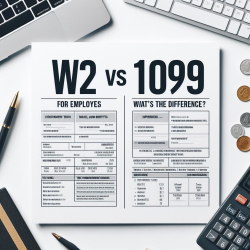
W2 Forms vs. 1099 Forms: Which Is Right for You and Your Employees?
It is of great importance to comprehend the difference between W2 and 1099 forms, whether as an employing entity or an individual contractor. Each serves different purposes and has different implications for the employer (for the business) and employees. Choosing the appropriate form assists to abide by the tax laws and, concomitantly, outlines the characteristics of the employer-employee relationship. Let us dive in and explain which form is suited for you and your salaried employees.
What are W2 and 1099 Forms?
W2 Forms:
A W2 form is a tax document used by employers to report an hand's periodic stipend and the quantum of taxes withheld from their hires throughout the time. Wage, tips, and other compensation specifics are listed every time taxes and deductions employ the federal, state, or original government. Employers owe their employees W-2 forms every January 31st.
1099 Forms:
Instead, a 1099 form is used for various kinds of income, just like freelance service, project work, or investment income. As opposed to W-2 forms, 1099 forms are about people who are not employees but have an agreement with businesses for pay. There are different kinds of 1099 forms for different types of income, like those for "1099-MISC" for miscellaneous income and 1099-INT for interest income.
Key Differences:
1. Employee vs. Independent Contractor:
W2 forms are used for workers who work directly for a company. Employers withhold taxes, give benefits, and cleave to labor laws for W2 employees. 1099 forms are for independent contractors or freelancers who work on a design base. They are not considered employees, so no taxes are withheld, and they're responsible for paying their taxes.
2. Tax Withholding:
For W2 employees, employers withhold income taxes, Social Security, and Medicare taxes from their hires throughout the time. Independent contractors are responsible for paying their taxes, including income tax, tone- employment tax( which covers Social Security and Medicare benefactions), and any other applicable taxes.
3. Benefits and Protections:
W2 employees are frequently entitled to benefits similar as health insurance, withdrawal plans, paid time off, and severance benefits. They're also defended by labor laws similar as minimal pay envelope and overtime regulations. Independent contractors do not admit benefits from the company and are not covered by labor laws that cover employees. They've further control over their work but also bear the responsibility of managing their taxes and finances.
Which Is Right for You and Your Employees?
The choice between W2 and 1099 forms is influenced by the nature of the working relationship and the employer's level of influence over them. Then are some factors to consider:
1. Control and Independence:
However, W2 employment might be the applicable choice, If you want direct control over how work is performed and give regular supervision. still, they may prefer being classified as an independent contractor, If the worker prefers flexibility in their schedule and has autonomy over how they complete tasks.
2. Duration of Employment:
W2 employment is generally suitable for long- term, ongoing positions where the employer provides harmonious work and the hand plays an integral part in the company. Independent contractor status is more suitable for short- term systems or technical tasks where the worker is hired for a specific purpose or time frame.
3. Legal and Tax Implications:
Misclassifying employees as independent contractors can lead to legal and fiscal consequences for employers, including fines and back taxes. Independent contractors have further inflexibility in abating business charges and may have access to certain tax benefits not available to W2 employees.
Conclusion:
Understanding the differences between W2 and 1099 forms is essential for both employers and workers. While W2 forms are used for traditional employment arrangements with tax withholding and benefits, 1099 forms are for independent contractors who manage their taxes and enjoy lesser inflexibility. It’s pivotal to precisely assess the nature of the working relationship and consult with legal and tax professionals to insure compliance with applicable laws and regulations. By choosing the right form, you can establish clear prospects and responsibilities for both parties involved, fostering a positive and fairly sound working relationship.
